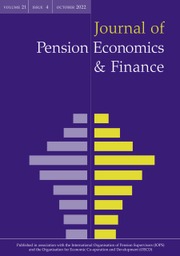Crossref Citations
This article has been cited by the following publications. This list is generated based on data provided by
Crossref.
Touzé, Vincent
2011.
Le financement des retraites aux États-Unis.
Revue de l'OFCE,
Vol. n° 118,
Issue. 3,
p.
63.
Ramaswamy, Srichander
2012.
The Sustainability of Pension Schemes.
SSRN Electronic Journal,
Fong, Joelle HY.
Piggott, John
and
Sherris, Michael
2012.
Public Sector Pension Funds in Australia: Longevity Selection and Liabilities.
SSRN Electronic Journal,
Zhavoronkov, Alexander
Debonneuil, Edouard
Mirza, Nawazish
and
Artyuhov, Igor
2012.
Evaluating the impact of recent advances in biomedical sciences and the possible mortality decreases on the future of health care and Social Security in the United States.
Pensions: An International Journal,
Vol. 17,
Issue. 4,
p.
241.
Jervis, Kathryn J.
Goldberg, Gerson M.
and
Cutting, Alan C.
2012.
Rights, Needs, and Equality of Opportunity for Health Care: A Financial Analysis of Morality.
Accounting and the Public Interest,
Vol. 12,
Issue. 1,
p.
62.
Mitchell, Olivia S.
2012.
When States Go Broke.
p.
57.
ALTIOK, HASAN U.
and
JENKINS, GLENN P.
2013.
The fiscal burden of the legacy of the civil service pension systems in northern Cyprus.
Journal of Pension Economics and Finance,
Vol. 12,
Issue. 1,
p.
92.
Totten, Thomas L.
2013.
Grabbing the Tiger by the Tail Complete Hybridization of the Retirement System Measured Two Ways.
SSRN Electronic Journal,
Altiok, Hasan U.
and
Jenkins, Glenn P.
2013.
Social security generosity, budgetary deficits and reforms in North Cyprus.
Journal of Economic Policy Reform,
Vol. 16,
Issue. 2,
p.
218.
Kelley, Dashle G.
2014.
The political economy of unfunded public pension liabilities.
Public Choice,
Vol. 158,
Issue. 1-2,
p.
21.
Godbout, Luc
Trudel, Yves
and
St-Cerny, Suzie
2014.
Le Régime de rentes du Québec : le rendement différencié selon l’année de prise de la retraite de 1968 jusqu’en 2056.
L'Actualité économique,
Vol. 89,
Issue. 2,
p.
89.
Lekniute, Zina
Beetsma, Roel M. W. J.
and
Ponds, Eduard H.M.
2014.
A Value-Based Approach to the Redesign of US State Pension Plans.
SSRN Electronic Journal,
Lekniute, Zina
Beetsma, Roel M. W. J.
and
Ponds, Eduard H.M.
2014.
A Value-Based Approach to Pension Redesign in the US State Plans.
SSRN Electronic Journal,
Beetsma, Roel M. W. J.
Lekniute, Zina
and
Ponds, Eduard H.M.
2014.
Reforming American Public-Sector Pension Plans: Truths and Consequences.
SSRN Electronic Journal,
Caldart, Paulo Roberto
Motta, Silvia Teixeira da
Caetano, Marcelo Abi-Ramia
and
Bonatto, Taís Vieira
2014.
The Fitness of Assumptions and an Alternative Model for Funding the Public Sector Pension Scheme: The Case of Rio Grande do Sul.
Revista Contabilidade & Finanças,
Vol. 25,
Issue. 66,
p.
281.
Fong, Joelle H.
Piggott, John
and
Sherris, Michael
2015.
LONGEVITYSELECTION ANDLIABILITIES INPUBLICSECTORPENSIONFUNDS.
Journal of Risk and Insurance,
Vol. 82,
Issue. 1,
p.
33.
LEKNIŪTĖ, ZINA
BEETSMA, ROEL
and
PONDS, EDUARD
2018.
A value-based assessment of alternative US state pension plans.
Journal of Pension Economics and Finance,
Vol. 17,
Issue. 2,
p.
129.
Ongena, Steven
and
(Ania) Zalewska, Anna
2018.
Institutional and individual investors: Saving for old age.
Journal of Banking & Finance,
Vol. 92,
Issue. ,
p.
257.
Altiok, Hasan U.
and
Jenkins, Glenn P.
2018.
The pension traps of Northern Cyprus.
Turkish Studies,
Vol. 19,
Issue. 4,
p.
612.
Hsu, John
Newhouse, Joseph
Overhage, Lindsay Nicole
and
Zuvekas, Samuel
2019.
Fiscal difficulties of cities, the labor market, and health care.
Journal of Pension Economics and Finance,
Vol. 18,
Issue. 04,
p.
565.


